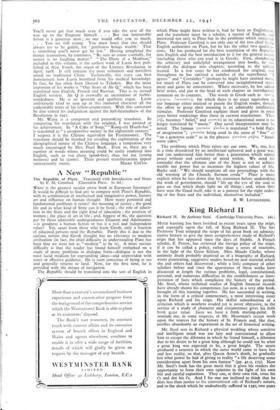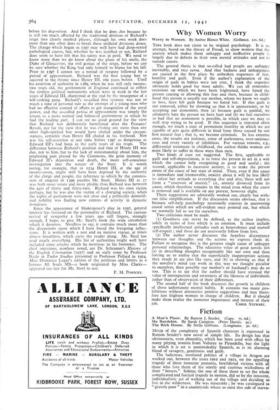King Richard II
Richard II. By Anthony Steel. (Cambridge University Press. v5s.)
Mum learning has been lavished in recent years upon the reign, and especially upon the fall, of King Richard II. The late Professor Tout enlarged the scope of his great book on adminis- trative history to give the most comprehensive study of Richard's reign that has appeared since the days of Stubbs. A French scholar, E. Perroy, has reviewed the foreign policy of the reign, if it can be called a policy, rather than a series of reactions, in the light of the Great Schism. Miss Maude Clarke, whose untimely death probably deprived us of a biography of Richard, wrote penetrating, suggestive studies based on new material which she and others had discovered ; while a little company of other scholars before and since the appearance of these works have discussed at length the various problems, legal, constitutional, personal, and numerous difficulties in the establishment or inter- pretation of facts which complicate the history of the period. Mr. Steel, whose technical studies of English financial records have already shown his competence, has now, in a very able book, brought all this learning together. He has succeeded in writing, in the form of a critical commentary, a most interesting essay upon Richard and his reign. His skilful subordination of a criticism which is nowhere evaded yet is never obtrusive, to the service of a study of character and circumstance gives his little book great value. Here we have a fresh starting-point. It reminds me, in some respects, of Mr. Moorman's recent work upon the sources for the history of St. Francis and, like that, justifies abundantly an experiment in the art of historical writing.
Mr. Steel sees in Richard a physical weakling whose sensitive and intelligent mind was too lazy and conventional to allow him to escape the dilemma in which he found himself, a dilemma due to his desire to be a great king although he could not be what a great king was expected to be, a great knight. The strain produced a neurosis in which the outer world came to have less and less reality, so that, after Queen Anne's death, he gradually lost what power he had of giving to reality " a life deserving some consideration apart from his own fantasy " (pp. 41-2, 175). Now Mr. Steel's book has the great merit that it gives his readers the opportunity to form their own opinions in the light of his own fair and careful exposition. They can, at their own risk, cross his is and dot his i's. And I for one am inclined to think that he does less than justice to the conventional side of Richard's nature, and to the shock which he undoubtedly suffered in 1397, two years before his deposition. And I think that he does this because he is still too much affected by the traditional division of Richard's reign into clearly marked phases, although his own work does more than any other does to break these artificial divisions down. The change which began in 1397 may well have had deep-seated pathological causes, but, whether he was justified or not, Richard does seem to have felt that his safety was in peril. We need to know more than we do know about the plans of his uncle, the Duke of Gloucester, the evil genius of the reign, before we can be sure whether the King had only himself to blame for his fall. Prior to 1397 I cannot see a period of tyranny followed by a period of appeasement. Richard was the first young boy to succeed to the throne since Henry III, i6o years before. Until his assertion of authority in 1389, when he was still only twenty- two years old, the government of England continued to reflect the restless political movements which were at work in the last years of Edward III, sharpened at the end by the insurgence of a self-seeking gang. Richard's so-called first tyranny was not so much a time of personal rule as the attempt of a young man who had no effective control of affairs to get recognition of the royal power, and the so-called period of appeasement was simply the return to a more normal and balanced government in which he had the leading part. I can see no good ground for the view that Richard was deliberately humiliated after the Peasants' Revolt, nor for the view that he was chafing any more than any other high-spirited boy would have chafed under the circum- stances, certainly than Henry III chafed in his boyhood. Nor was his self-assertion at any time before 1397 so dangerous as Edward III's had been in the early years of his reign. The difference between Richard's position and that of Henry III was due, not to him, but to the lack of statesmanship about him, the perplexing part played by the Commons, the grim memory of Edward II's deposition and death, the more self-conscious investigation into the nature of the State. It is worth noting, for example, that in 1234 Henry III, at the age of twenty-seven, might well have been deposed by the authority of the clergy and people, the reference to which by the commis- sion of enquiry in 1399 puzzles Mr. Steel. Henry III at 27 was both more astute and more pliable than Richard was between the ages of thirty and thirty-two. Richard was his own victim perhaps, but he was also the victim of a changing society, when the rights of parliament were not clear and a politically demoral- ised nobility was finding new centres of activity in dynastic frondeurs.
Since the appearance of Shakespeare's play in 1597, general interest has fastened on the personality of Richard. The curious revival of sympathy a few years ago still lingers, strongly enough, I hope, to give Mr. Steel's book the wide circulation which it deserves. Needless to say, it contains much more than the discussions upon which I have based the foregoing reflec- tions. It is written with a zest and an incisive vigour, at times almost breathless, which carry the reader along. Mr. Steel has read nearly everything. His list of authorities might well have included some articles which he mentions in his footnotes. The chief omissions, nowhere noted, are Dr. Schramm's History of the English Coronation (1937) and an early essay by Professor Neale in Tudor Studies presented to Professor Pollard in 1924. Miss Dominica Legge's edition of the petitions and letters in a famous All Souls MS—a book originated by Miss Clarke— appeared too late for Mr. Steel to use.
F. M. POWICKE.



























 Previous page
Previous page